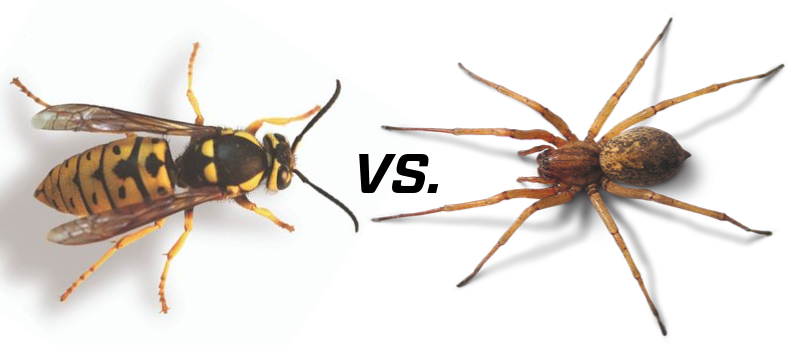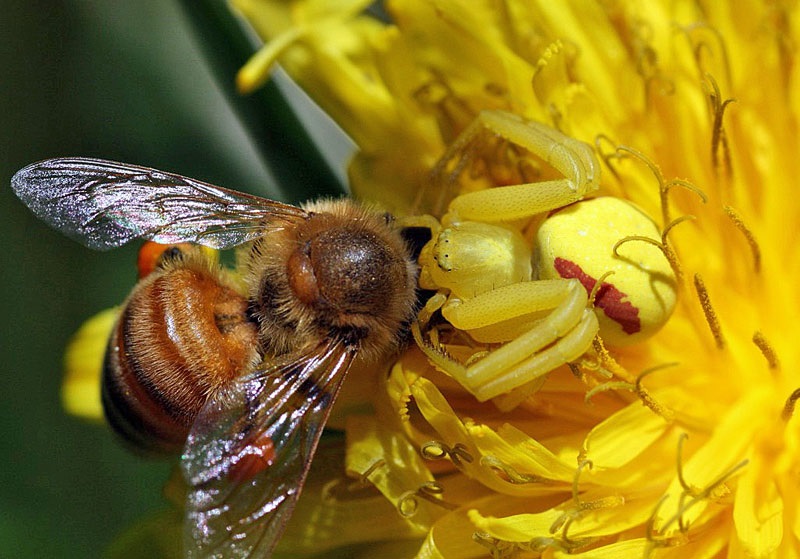This is a question that gets asked by lots of people. Many species of bees will feed on spiders as part of their diet. It’s also common for bees to collect spider webs to take back to their nest for insulation purposes.
The answer, in the majority of cases, is yes. It’s not just regular worker bees who eat spiders. Bees will also eat spider prey during their different life cycle stages. The most common bee to eat spiders is the larvae of the Trichogramma Wasps, but many other types of wasp larvae will feed on spiders, too. It’s thought that over 400 species of bees include spiders in their diet.
Table of Contents
Do bees attack spiders?
Not all bees will attack spiders. In fact, most bees are quite timid creatures that don’t want to fight anything as large as a Spider. Bees usually only try and defend themselves if they’re being attacked by something, especially other insects.
However, there are some types of bees that have been known to go on the offensive against larger prey such as spiders. Solitary bees, also known as ‘digger bees’ will sometimes attack wolf spiders if they’re defending their nests. Mining bee larvae, which are up to 1 inch in length, will aggressively defend their nests against larger predators such as Wolf Spiders.
Bees will sting spiders, although they usually do so to put them in a state of paralysis. This is so the spider can be eaten more easily. Spiders often have hairs on their bodies which can irritate or poison bees. When this happens, the bee may bite off these hairs before eating the spider.
Do bees eat spiders?

The answer is yes, but it’s normally only done when they are in the larva stage. Bees will also collect spider webs, but they do it for insulation rather than as food.
Bees are probably the most well-known type of insect that eats spiders. Many bee species eat these creatures as part of their diet, especially during the larva stage of development. It’s common for many types of bees to eat spider prey during their different life cycle stages.
Bees will eat spiders in lots of different species. Some bees, such as bee larvae of the Trichogramma wasp, eat only spiders. Bees often feed on spiders when they’re in a state of paralysis. They may also bite off hairs from the spider’s body before eating it. Spiders can be useful to have in the garden, so there’s no need to kill them if they’re outside.
What kind of bees eat spiders?
There are lots of different types of bees that eat spiders. In North America, you can find bees that include spiders in their diet. The larvae of the Trichogramma wasp also feed on spider prey. It’s been estimated that over 400 species of bees will eat spider prey at some point in their life cycle.
Do wasps eat spiders?
Yes. Many different types of wasp larvae will eat spiders as part of their diet. The nests of these creatures also make great homes for other beneficial insects such as ladybugs and green lacewings.
In the UK, wasps generally start to get active during May when they begin looking for new food sources. You can often see these creatures flying around late in the evening, but they’ll usually head to spider webs to steal their prey.
Wasps will eat spiders, although they tend to stick to the bigger prey items. Wasps often have a preference for bees and other flying insects as their food source.
However, as with bees, wasps will often feed on spiders when they’re in a state of paralysis.
Why do bees eat spiders?
There are lots of reasons why bees might eat spiders. Most importantly, it’s a source of food for the bee to help it grow and develop. Bees may also eat spiders in order to provide their young with a protein-rich diet.
Spiders can be a good source of protein, which is an essential part of any growing bee’s diet. It’s also thought that bees will eat spiders to make their nests more waterproof. As part of the bee-making process, they’ll collect spider webs to use as insulation for the nest.
Why do wasps eat spiders?
Wasps will eat spiders in order to provide food for their young. Like bees, wasps often stick to eating bigger prey items such as flies and soft-bodied insects. When the spider is in a state of paralysis, it’s much easier for them to be eaten by the wasp.
Bees often catch spiders when they’re in a state of paralysis. This means the spider isn’t able to react quickly enough when a bee is approaching it. It’s also common for bees to collect webs from spiders, which are used as insulation for their nests.
It is true that wasps and bees do eat spiders. However, the question we pose to you at this point is why? Why does a bee or wasp want to attack and consume a spider in their natural habitat?
The answer may be because there are not enough flowers nearby for them to feed on. A flower provides sustenance so these insects can live longer! But if they cannot find any nearby, then they will hunt down another food source such as a spider to survive the winter months ahead.
